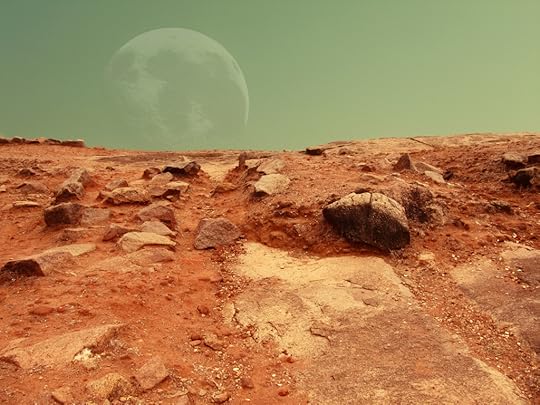M. Thomas Apple's Blog, page 40
December 28, 2020
Tardigrads…In…Space…I mean, On the Moon…

Despite the impact, scientists believe that if anything survived the crash intact, it may well have been the tardigrades. The microscopic creatures were sandwiched between micron-thin sheets of nickel and suspended in epoxy, a resin-like preservative that acts like a jelly — potentially enough to cushion their landing.
https://www.inverse.com/science/tardigrades-may-have-taken-over-the-moon
I, for one, look forward to our lovably cute waterbear overlords…
December 27, 2020
Amateur Thai astronomer photographs unknown Sungrazer

This family of comets originated from a large parent comet that broke up into smaller fragments well over a thousand years ago. The sungrazers continue to orbit around the sun today.
https://edition.cnn.com/2020/12/21/world/new-comet-solar-eclipse-scn/index.html
Now this is something I didn’t know. Learn a new thing ever day…
Bringer of Light, Chapter 9 (Part 2): Mars Colonies
(In part 1, Weng found himself suddenly promoted and about to be thrust into the spotlight…)
He toggled the console, and the row of monitors sprang to life. Weng found himself addressing no less than half a dozen delegates, all of whom wanted to speak simultaneously.
In fact, they appeared to have already begun discussing among themselves.
“—told you that the Indian government would never—”
“—not what we ordered! And where are the supplies we requested last—”
“Hasn’t the Martian Secretariat been in—”
“Gentlemen! Gentlemen!” Martin began, holding his hands up in surrender.
“Women,” someone interrupted.
“Men and women,” Martin corrected. “We have been made aware of your food supply issues and—”
“What are you going to do about it? We’ve been waiting four days now!”
“Mr. Mbutu, believe me, the needs of the CAA settlers are well known to us—”
“The EEC has priority over African settlers! We arrived first, we have—”
The delegates raised their voices and general argument prevented Weng from understanding much. Martin smiled and raised his hands again.
“Gentlemen and women! Delegates! Please, please! I have—”
The discussion continued for another minute or two. Martin turned to Weng and nodded.
Weng coughed into a fist before speaking.
“Excuse me,” he tried. Too soft. The delegates continued.
“—Persian Empire will make you regret any theft of property from—”
“Excuse me!” Weng fairly shouted at the screens.
The voices died down. The delegates looked at him.
Weng cleared his throat.
“Gentlemen, ladies. I have spoken to many of you these past few days, about your heat, your electricity—”
“Yes, yes,” huffed one delegate. “For all the good it did.”
Weng nodded in agreement.
“I’m afraid you are correct, Ms. Pehrat. However, that has not prevented us from developing an amicable and mutually beneficial relationship, has it not?”
Silence greeted this response. Martin pinched his arm from behind. Evidently, an encouraging gesture.
“Look,” Weng went on. “I know that we are asking much of you and your constituencies. But we must ask you all to realize that our situation is quite dire at the moment.”
“Dire?” Mbutu asked. “How dire, exactly?”
Weng cleared his throat again.
“I am given to understand that, er, due to the rapid increase in the need for electricity to power new settlement districts we will need to begin water rationing.”
“Begin?” Pehrat cried. “We’re already rationing!”
Several delegates jumped in.
“Intolerable!”
“Outrageous!”
“Please! Please!” Martin tried to interrupt again.
The delegates shouted him down in a cacophonous paroxysm.
“Water,” Weng mused as the din rattled around him. “Water…wait!”
He grabbed the sides of the desk and shouted at the screens.
“Wait! Wait! There may be a way.”
“The electrician speaks!” Mbutu laughed. But the other voices died down.
Martin interrupted. “Dr. Weng,” he said, emphasizing the word ‘doctor’, “Dr. Weng is the head of the Martian Colony Water Reclamation Project Team.”
“Ah,” Mbutu exclaimed.
“Thank you, Overseer,” Weng said. He straightened and opened his hands. “Water is needed for producing electricity due to a lack of other energy sources.”
“Yes, yes, we know,” Mbutu commented. “And?”
“What if…” Weng began.
He paused. He raised a hand, stretched out his fingers as if to gesture, and paused again, thinking.
“I have two proposals,” he suddenly announced. “First.”
He stopped. He glanced at Martin. The Overseer maintained his politician’s smile.
“First,” Weng repeated, “We do have the capability to release more water into the water reclamation system. However, we do not presently have enough workers to dig up the regolith required for the process.”
The delegates were silent for a moment.
“What you are suggesting,” Pehrat offered, “would require many, many rounds of negotiations among our nations.”
“We don’t have time for that,” Weng said. “I don’t know the delicate nature of politics but I do know the technical possibilities and necessities of our current situation.”
Pehrat was silent, seemingly considering the truth of his statement.
“I do know,” Weng continued, “that we all need each other. To cooperate, for mutual benefit.”
He stopped and held up two fingers.
“Second.”
Martin briefly dropped his smile but recovered.
“Second,” Weng said heavily. “It seems likely that we may still not get the water reclamation process started in time to suit our immediate needs. I estimate two to three months before processing will be adequate.”
Martin smoothly interposed. “In that case, what do you propose? Won’t rationing be enough?”
“I’m afraid not,” Weng said. “I propose that the United Mars Colonies—”
“The what?” Mbutu blurted.
“Dr. Weng, there’s no such—” Martin began.
Weng continued, “—that the United Mars Colonies send an envoy or envoys to Ceres for the purpose of procuring an emergency supply of water strictly for the drinking supply. Not to be used for electrical generation.”
Martin grabbed his arm, hissing, “We must talk.”
Turning to the screens and smiling, he said, “Pardon us for a moment. Please hold.”
He stabbed at a button on the desk, then turned back to Weng, furious.
“What on earth do you think you’re doing?”
Weng regarded the Overseer calmly. “We’re not ‘on Earth’.”
“For the love of—you know what I mean!”
The Overseer began to pace, waving his arms. “The Moon Treaty of 1979, the Outer Space Exploration Treaty of 1991, and the Mars Mining Treaty of 2031 all forbid any one nation to act on behalf of citizens of other sovereign nations working or living off-world!”
Weng blinked. “Meaning?”
Martin stopped.
“Meaning,” he said heavily, “each group of settlers is bound by the laws of their countries, and we cannot speak for them as a group!”
“But,” Weng said, “most of these recent settlers are obviously refugees, and their governments have either not contacted us or have been evasive and vague in our communications.”
“True, all true,” Martin retorted, agitated. “But I work for the UN. Not ‘the United Mars Colonies,’ whatever the hell that is.”
He stopped pacing and frenetically ran his fingers through his hair.
“Martin,” Weng said.
The politician looked over him, and clasped his hands in front like a prayer.
“Weng, I have already had to agree to give each and every country its own territory, in stark contrast to existing UN directives. Separated each group by a minimum of 1.4 kilometers. Forbidden settlers from other nation-states to enter their territory without permission.”
“And has that prevented settlers from communicating with each other?”
“Ah…”
“Or sharing their supplies, which they got from us?”
“Um. Not in so many words, no.”
“And yet,” Weng continued, “the UN has obliged us, as a central authority, to supply housing, food, water, power, communication facilities. All despite the fact these settler factions are supposed to be operating independently. Correct?”
“Yes, yes,” Martin replied quickly.
Weng approached the near-panicked politician. He held out his hands to calm him down.
“Look, we need water, yes?”
Martin nodded, rubbing his palms together.
“And we need water from the asteroid reclamation plants on Ceres, because we can’t get ours to produce enough water fast enough and we can’t convince the UA to give us any of theirs. Again, correct?”
“Yes, that is essentially the situation.”
“And we only have three months before we run out of drinking water?”
Martin swallowed and nodded again. “I believe those are the current estimates.”
Weng smiled. Actually, he had no idea what the current estimates were. Nor how long it would take to produce more if the settler factions agreed to donate workers. Probably he was close to accurate. But that hardly mattered, to get what he wanted.
“Now,” he continued, “if we were to ask Ceres for water, as per UN regulations, we would have to go through each country’s delegation, then wait for an answer from their respective countries, then wait for the answer to, ah, filter back through the delegates.”
Again, Martin nodded, this time with more certainty.
“So,” Weng concluded. “If we approach Ceres not as the UN, beholden to separate, divided, bickering nations, but as a sort of united group of fellow outer space residents, wouldn’t the mining community on Ceres treat us as a single entity? with slightly more respect?”
Martin looked dubious. “I’m not as confident as you on that issue,” he said slowly. “However—”
“Good,” said Weng. He strode back to the ugly yellow desk. “I’ll convince the delegates that a temporary alliance and a united front will get us more water.”
“Wait!” Martin called out. “Let me, let me stand next to you. You talk, I’ll support.”
Weng shrugged. “Support” sounded like “use you,” but he supposed they, too, needed to show a united front.
In the end, he would get what he wanted, he thought, inwardly grinning. And it would only cost him an extra trip to Ceres to see Riss.
Next: Chapter 10 (Part 1) The Artemis (Coming January 2nd)

December 25, 2020
Happy (Insert non-denominational festive day of chosen ethnicity/religious group here)

Happy (Insert non-denominational festive day of chosen ethnicitity/religious group here)

December 19, 2020
Bringer of Light, Chapter 9 (Part 1): Mars Colonies
(While the crew of the Artemis is enduring the long return home, on Mars, Weng is about to run into a problem that is partly of his own making…)
“But, Martin, the designs I sent you were already approved by the new settler delegation from…”
“Sorry, Sam. I know this is important to you, but with the heightened tensions Earthside right now, the priority is foodstuffs.”
“Yes, but—”
“The existing domes will have to suffice for the moment. Why don’t you come down here when you have a chance. We’ll have a chat over ruibos tea.”
Weng stared at the blank space above his console where the 3D holograph had once been. The Overseer had simply cut the transmission without a proper ending salutation.
Dammit it all! He picked up his coffee cup with a trembling hand, but resisted the impulse to throw it.
Taking a sip, Weng stared at the empty space again, as if the image of his superior still remained, smiling at him.
Nothing had changed. Inwardly he raged, as his face strived for control.
What a fool he had been! To think that anything would be different on Mars. Bureaucracies were all the same, he thought. Only interested in perpetuating themselves. Efficiency? Effectiveness? Not necessary, as long as the status quo was maintained.
Artistry?
He scoffed at his own conceit.
Delusional thinking. Who had time for art with all the work foisted upon him? It had been nearly three weeks since his arrival, and in that time nearly a dozen ships had arrived from multiple countries Earthside. Just over a hundred settlers from the Eastern European Union. A hundred sixty from the Greater Indian Empire. Eighty-three and then ninety-four from the Central African Alliance. More and more each day, it seemed.
The problem was, the UN directives they were forced to operate the Colonies under were confusing, at best. No single country was allowed to lay claim to any particular region of Mars, or of space in general. But now with multiple factions all vying for breathing room, preventing ethnic groups from staking claim to their own territory had proven nearly impossible.
The Iranians didn’t want to be near the Chinese. The Ukranians didn’t want to be next to the Slavic Federation. The Central African Alliance demanded separate territories for each member nation. Only the United Americas hadn’t laid a claim, and that was only because no new settlers from them had arrived. Weng supposed they would prefer to go to Lunar Base, which the UA controlled. Politically, anyway.
He sighed and swirled his cold soy coffee around the cup. Things were no better here on Mars than they had been back on the Moon. If anything, they were worse. Weng had never seen so many different nationalities trapped in such a small confined space before.
He paused, set the cup down in front of the antiquated console, and pondered.
The timing seemed odd. Transition from Earth to Mars normally took at least a full year, nearly three years at their farthest distance apart. Of course, the docking at ISS would allow for reduced payload and less cost. But still, these ships would have taken off from their respective countries long before the current tensions started.
Unless they had somehow known ahead of time, of course, that something was about to happen. That didn’t bode well.
Weng lifted his info pad from its wireless charging port and shut the desk power off to save electricity.
If he had to play the role of the transparent pen-pusher, then for the time being he’d simply have to play along. As the Sage wrote, long ago, “Do not worry that your talents are unappreciated. Make yourself worthy of being appreciated in the future.”
He left his tiny office and entered the narrow underground corridor leading to the central hub. He stepped on the pedwalk and jotted a few random, unnecessary notes on his pad. Keeping the Sage’s words in his mind, Weng made additional mental notes of the lighting, the ceiling, the wall and doorway fixtures. Coarse behind belief. Functional, naturally. The need to protect civilians from radiation meant that every domicile had to be covered in several feet of Martian soil. Still, technology had advanced since the early days of Martian settlement, Weng thought. Why hadn’t someone planned better?
The automated 3D printers had been working nonstop; as soon as one dwelling was assembled, it filled and another had to be prepared. The robotic diggers struggled to connect all the adobes, and their haste showed. Here in the central habitats, where the original settlement had been transformed into a series of UN-Mars colony liaison offices, atmospheric control allowed them to use the automated walkway without wearing any exosuits. Each living unit came equipped with high-speed wifi and personalized access ID for connectivity to the Mars Colony Net.
But the corridors between the new adobes had no fresh air and virtually no heat. Just getting them all hooked up to the electrical grid was proving a struggle, let alone set up wifi and walking strips. It was all they could do to keep the hydrocarbon-driven generators running to prevent the new settlers from freezing and starving.
Weng curled his lip in disgust at the thought of wearing an exosuit to get to work. Drinking his own recycled sweat and urine to reduce the strain on their water supply.
No mobile access to vids.
He shuddered.
A notification from his ID badge told him the pedwalk was reaching the end of the corridor. He staggered as the automated strip abruptly halted. Still several meters from the end. Righting himself quickly, he immediately jotted down on his pad, Maint. crew fix pedwalk Sector 1A-2. Stat.
Inexcusable. The Mars Colony simply could not take on any new settlers at this point. It couldn’t even maintain structures for existing residents.
He clamped the pad shut and strode off the pedwalk into the building before him. The Central Offices. The original building had been adobe like all the new facilities, he had been told. Now it was a complicated reinforced plexiglas and native concrete structure, complete with UV and solar radiation protection shield.
What would happen if the new settlers weren’t sufficiently shielded? he wondered.
Weng shrugged, dismissing the thought. His job at the moment was to make sure they had enough water to go around. And since much of the electricity in the Mars Colony was produced from water, this was more easily said than done.
Entering the Central Office lobby, he waved his ID at the receptist. The cyborg nodded and gestured at the next door.
“Go ahead, Mr. Weng. The Overseer is waiting.”
“Thanks.”
Weng was sure the simulacrum was smirking. Not possible, he knew. The cyborg was programmed to respond to a tens of thousands of combinations of external stimuli, but despite the human-like torso, arms, and face, it was still just a machine. A creepy machine, but a machine.
That smile did look like a smirk, though. He shook his head and paused at the closed door. From the other side, he heard a raised voice. Martin seemed to be arguing with someone.
He touched a hand-size panel in the door, and a faint buzzing noise came from within the room.
There was a pause. Then, “Come!”
The door opened. Facing the door several meters away was a large off-white plastic desk, with Martin seated behind it. The desk had seen better days. Early Colony, Weng guessed, realizing with a start that his own desk looked much newer and likely had a much more recent computer set up as well. He felt slightly embarrassed.
“Ah, Sam, good to see you,” the Overseer said, beaming. He gave no indication of just having finished a conversation.
“Over—Martin, I wanted to see you about—” Weng began.
“Of course, of course,” Martin responded, jumping to his feet. “Tea?”
Before Weng could respond, Martin had already placed the order. A series of buttons lined the left side of the desk. That further dated it. Buttons! Just like the water reclamation plant room.
“Martin,” Weng started again, “have you given any thought to my proposal?”
Martin nodded, then shook his head. “Yes, yes, I have.”
Weng opened his mouth but the Overseer forged on.
“And I have a counter proposal for you.”
A buzzer sounded.
“Ah, that would be the tea. Come!”
They waited as a drone-server wheeled into the room, deposited two plain aluminum cups on the desk, and then wheeled backwards into the lobby area.
The door closed.
“How would you like to be the head of the water reclamation committee instead of just a member?”
Weng nearly dropped the cup, but managed to bring it to his mouth. He took a careful sip.
Not bad. Upper management had its perks.
“Head?” he stammered. “Martin, you know that I’m more interested in—”
“Architectural redesigns of the settler units, yes, of course.”
Martin raised his own cup and drained it without a glance.
“But,” the Overseer continued, “before we can consider expenditures on superficial concerns—however noble and proper they may be, mind you!—there are more immediate, ah, considerations.”
“Such as foodstuffs?” Weng cut in.
He bit a lip. That sounded too indignant.
Martin cocked an eyebrow.
“Water, Sam. Water.”
“Martin, these people have no heat. No access to the Net. Their electrical grid set up is archaic. A good architectural redesign would alleviate—”
“Yes, I know. And you’re absolutely correct. 100%.” Martin paused. “But they need water. And we haven’t got any.”
Weng paused. “No water?”
“No water,” Martin repeated. “Well, not literally no water, but we must start to ration or we’ll run out within a few weeks. Well, not to exaggerate. A few months, perhaps.”
Weng slowly lowered the tea cup to the plastic desk. The tea felt stale in his mouth now. How much water had they wasted making it just now?
“Electricity,” he said. He looked up at the Overseer. “We’re using too much on the generators.”
Martin nodded somberly. “Yes, exactly so. And that’s what you need to tell the head of the settler delegations.”
Weng laughed. “Me?”
“Yes, you.”
Weng stared. The Overseer wasn’t joking.
“Martin…you must…are you…me?”
Martin draped an arm across his shoulders. “Look. It’s all very simple. You know these people already. You’ve been meeting with them, working with them. You’ve shared your concerns with them about their situation.”
Weng winced at the Overseer’s touch, but allowed himself to be led behind the yellowing desk. An array of ancient computer monitors stared up at him.
The architect resisted the urge to curl a lip. First generation networking like this belonged in a museum, not the Office of the Martian Secretariat.
“Here,” Martin gestured. “I’ve already got a meeting set up with several colonist delegates.”
“But—”
“Just follow my lead,” Martin said urgently. He eased into a smile. “They trust you. Let’s play.”
Next: Bringer of Light, Chapter 9 (Part 2): Mar Colonies (Coming 12/26)
In which Weng finds himself at the center of a fight and makes a proposal that will change everything…

December 18, 2020
A sneak peek at the inside of the Red Planet

Despite the lack of large marsquakes, the researchers were able to estimate how thick Mars’ crust is. They predict it has three layers—but possibly two—that are between 12.4 and 23 miles thick, reports Nature. Mars’ crust is considerably thinner than that of Earth, which can be up to 25 miles thick—and that’s surprising, reports Science.
https://www.smithsonianmag.com/smart-news/robotic-explorer-mars-offers-sneak-peek-mars-inner-layers-180976568/
Lots of small “Marsquakes,” but nothing big. Max M4.5.
A techtonically silent world. Might explain the weak magnetic field which allowed solar winds to rip off its atmosphere long ago.
December 13, 2020
Iwájú = The Future

“This show will combine Disney’s magic and animation expertise with Kugali’s fire and storytelling authenticity. Iwájú represents a personal childhood dream of mine to tell my story and that of my people.”
https://whatsondisneyplus.com/iwaju-coming-soon-to-disney/
Disney is throwing millions at boring remakes. But at least this series is new. Forget “Little Mermaid.”
You can’t rewrite the past. You can co-create the future. This is a good step.
December 12, 2020
Bringer of Light, Chapter 8: Enoch
(Riss is the leader of the Artemis Crew, Brady is the scientist, and Sanvi the pilot…but Enoch is the one who knows the way to go. He hopes.)
Kapow! Another German plane on fire, spiraling down from the sky, destroyed by a hail of bullets from his trusty Hellcat.
“Fuck you, Focke-Wulf!” Enoch chortled. His gloved hands danced in the air, finger tips wiggling as his 3D-goggled head bobbed back and forth.
He had no idea how long he’d been flying. What an addictive game! he couldn’t help thinking, as he shot down a Zero.
It made no sense, of course, but the game scenario creator allowed him to populate the battle with planes from any country, any time. He could have included a Sopwith Camel from the first world war, or a Mars Warplane from the shortly-lived Mars Colonies War if he felt like it.
But his favorite was World War II planes. Especially the Zero. How many times had he imagined himself saving the Pearl City from the Japanese invaders? Enoch, the hero, the half-Jewish, half-Irish Hawai’ian…
A stray memory entered his head as his Camel swooped over Diamond Head, strafing the dastardly Zero trying to attack hapless Waikiki swimmers as they sunned on Kahanamoku beach. He tried to push the thought away; once, twice, his fingers twitched, sending burst after burst of virtual machine gun fire into the Zero’s side. The enemy shuddered, smoke spurted from its canopy, and began its descent into the pounding surf.
He pulled back on the throttle and veered right, soaring over Nu’uanu Pali, aloft on the wind that warriors of old would challenge. Jumping contests of bravery, daring the wind to push them back over the cliff, or failing in the eyes of the gods and falling to their deaths on the rocks below.
He let go of the controls. The plane sailed straight through the valley.
The hill of Kaipu-o-Lono on one side, Napili on the other.
Enoch’s grandfather often told him the stories of the piko stones, Hapu’u and Kalae-hau-ola, twin goddesses guarding and protecting the children whose parents made the appropriate sacrifice and performed the ritual of blessing.
“The stones are gone now,” Grandfather told him, when Enoch was a boy. “Destroyed by the haule who took our kingdom away from us. But the stones will return in time. And their spirit still guards us, even now.”
But Enoch was not pure Hawai’ian. He was not even hapa haule. Not for the last time, he wished that his father had not been Irish-Hawai’ian, his mother not Jewish.
“Shit,” he exclaimed, tearing the headset off and flinging it at the floor of his sleeping cabin. He yanked the controller glove off and clenched it in one fist. But he stopped himself, released the glove. It hung mid-air, fingers gently bobbing up and down like the disembodied hands in the Evil Dead movies.
He sat up in the bunk.
Who the fuck ever heard of an Irish-Jewish Hawai’ian?
From the Moon, no less.
A sudden banging noise came from the other side of the wall. Sanvi.
“Knock it off, Karate Kid!” Enoch shouted, knowing full well she wouldn’t hear him clearly. Who cared. She hit the wall about once every two days. What the hell was her problem, anyway?
He massaged the back of his neck, resisting the urge to stand up and stretch. Being born off-Earth had its advantages. Enoch’s height gave him the reach others lacked, but it sucked to be in a cramped cabin on a ship built for four Earthers.
Loonie. Yeah, he was a Hawaiian Loonie. Who had never been to Hawaii, and never would. Not without a special pressure suit, complete with robotic supports so that he could walk in normal Earth-g. And who needed electronic implants to see, because the Moon’s low gravity had permanently effed up the fluid inside his eyeballs.
At least he could zoom-in. Definitely a targeting advantage.
He folded his hands behind his head and stared at the ceiling. The vidgame headset floated upward opposite his bunk, gently rebounding against the door.
Another loud noise from the wall. Sanvi must have hit it twice.
Enoch shrugged. He thought she was cute, on first joining the Artemis crew. Hell of a fighter. With his Loonie-bones he stood no chance against her in a scrape. But the mysticism she got so hung up on was a major turnoff.
“Aren’t you interested in Kabbalah?” she asked him once, in the mess room. “You know, being Jewish and all?”
“I’m Hawai’ian, not Jewish,” he replied.
“But it’s fascinating!” she persisted. “Elements are similar to Zen…”
He had to let her babble on while he focused on his freeze-dried beans and faux-spam. He still wouldn’t touch real pork — who knew what was in it? Especially in deep space rations — but he just wasn’t interested in religion. Any of it.
He pushed the memory away. Another came to mind; Grandfather, taking him out for a swim in the Sea of Showers.
“When I was your age,” Grandfather was saying, “there wasn’t any water on the Moon. Not above ground, anyway.”
Enoch splashed his grandfather and laughed. “Bet it was colder, too,” he joked. “Bet you froze your tuckus off!”
“Language!” Grandfather said sharply. But the old man smiled.
Enoch looked out across the sea. “I can’t see the other side,” he complained. “It curves too much. Nothing to see.”
“That never stopped your ancestors,” Grandfather said. “The great navigators of the Sea, they had only the stars, the currents, the wind to guide them. Read the stars, Enoch. Let the universe be your guide.”
Enoch frowned at the memory. The stars, he thought bitterly. The gravity wells and planetary magnetic fields. He had learned. Those who controlled his life had not.
Like those morons at Zedra. What did they know that he didn’t? He didn’t need their help plotting trajectories for the thrower. He didn’t need their stupid pings about “optimal course projections” for returning to the happy hunting grounds, either. Artemis was his ship.
Well, Riss’s ship, technically.
He grinned. He’d do anything for that woman.
Sometimes in the command center, when she was lost deep in thought, staring out the window like she usually did, Enoch would try to sneak glances back at her. A little older than him, true. But still. He had a pretty active imagination. Too bad she had a boyfriend.
He shook his head. Fiancé, he heard. Some other Loonie. Nah, had to be an Earther sent to Luna for the government. Somebody connected to Bardish. Like Riss.
Dammit!
He grabbed the vidset and control glove again. No point in feeling sorry for himself. His time would come. Meanwhile, there was always the Hellcat.
Next: Bringer of Light, Chapter 9 (Part 1): Mars Colonies (Coming 12/19)

December 8, 2020
The Galactic Federation has spoken
Presented without comment. #GalacticFederation #SpaceTheFinalFrontier #ReeducationAwaits #MarsRising #SpaceOrBust #Fnord
[image error]



